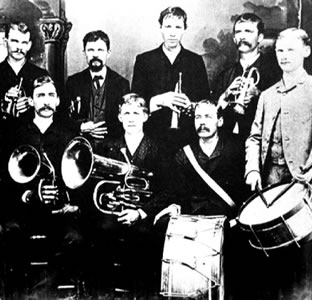Institute of Texan Cultures exhibit looks at 1840s German immigration

Loesscher Band of Cat Spring, one of the first German-American settlements in Texas (Institute of Texan Cultures, 072-3232)

Loesscher Band of Cat Spring, one of the first German-American settlements in Texas (Institute of Texan Cultures, 072-3232)
(Sept. 9, 2010)--The Institute of Texan Cultures and Humanities Texas examine the story of German immigration to Texas during the 1840s in the exhibit "Lone Star and Eagle," which is in the rotating exhibits gallery through Sunday, Sept. 19.
The exhibit takes its name from the heraldic German eagle and the iconic Lone Star of Texas. It features 12 panels with reproduction newspapers and headlines, historic images, paintings, maps and other significant details on the German experience in Texas.
Many Germans fled the civil unrest of the 1830s and 1840s in Germany seeking intellectual and religious freedom in Texas. Under the Adelsverein, the Society for the Protection of German Immigrants to Texas, German settlers received passage, land and material aid. Poorly organized, the society fell victim to land speculators and disreputable businessmen.
Despite the situation, German Texans grew into one of the most prominent cultural groups of the era. They established the towns of New Braunfels and Fredericksburg in 1845 and 1846 and continued to build communities in larger towns.
John O. Meusebach, a nobleman who renounced his title to lead the German effort in Texas, brokered a peace treaty with the Comanche tribe, opening the land between the Llano and San Saba rivers to settlement and exploration. It is believed to be the only treaty between the Indians and whites that was not broken.
German Texans established schools, commerce, arts and thriving communities. In addition to the Humanities Texas panels, the Institute of Texan Cultures has elaborated on aspects of the German experience in Texas. The exhibit features historic images from the institute's photo archive and a collection of German artifacts from San Antonio and the surrounding region. "Lone Star and Eagle" briefly explores the Finck family (Finck Cigar), Walter Menger (Menger Hotel), C.H. Guenther (Pioneer Flour Mills) and organizations such as the turnverein (athletic club) and Hermann Sons Lodge, a fraternal benefits society.
The Institute of Texan Cultures is on the UTSA HemisFair Park Campus, 801 E. Durango Blvd., a short distance from the Alamo and the River Walk. Hours are 9 a.m.-5 p.m., Monday-Saturday; noon-5 p.m., Sunday.
Admission is free with membership and for UTSA students, faculty and staff with UTSACard and with Alamo Colleges identification. General admission is $8 for adults (ages 12-64); $7 for seniors (ages 65+); and $6 for children (ages 3-11).
For more information, call 210-458-2300 or visit TexanCultures.com.
------------------------------
The Institute of Texan Cultures, through its research, collections, exhibits and programs, serves as the forum for the understanding and appreciation of Texas and Texans. The institute strives to become the nation's premier institution of contemporary cultural and ethnic studies focusing on Texans and the diverse cultural communities that make Texas what it is.
A Smithsonian Affiliate and an agency of the UTSA Office of the Vice President for Community Services, the 182,000-square-foot complex features 45,000 square feet of exhibit space and five re-created Texas Frontier period structures.
Events
Fiesta Arts Fair features contemporary art from more than 100 artists from across the U.S., Fiesta favorite foods, drinks, live music by local and regional performers, and a Young Artists Garden providing opportunities for budding artists to learn, explore and express their creativity.
UTSA Southwest CampusJoin the PEACE Center and Wellbeing Services for Denim Day, a day of learning about the importance of consent and why we wear denim on the last Wednesday of the month each April during Sexual Assault Awareness Month. Stop by our Denim Day display to take a photo in front of our Denim Wall, spin the "Is It Consent?" Wheel, and get a Concha or goodie.
Student Union Window Lounge, Main CampusLearn to use Zotero®, a citation manager that can help you store and organize citations you find during your research. Zotero can generate bibliographies in various styles, insert in-text citations and allow you to share sources with collaborators.
Virtual EventThis event is to achnowlege the graduating seniors and induct the new cohart of scholars to our program.
North Paseo Building (NPB 5.140,) Main CampusCelebrate the accomplishments of College of Education and Human Development, College for Health, Community and Policy, College of Sciences and University College.
AlamodomeCelebrate the accomplishments of Alvarez College of Business, College of Liberal and Fine Arts and Klesse College of Engineering and Integrated Design.
Alamodome

